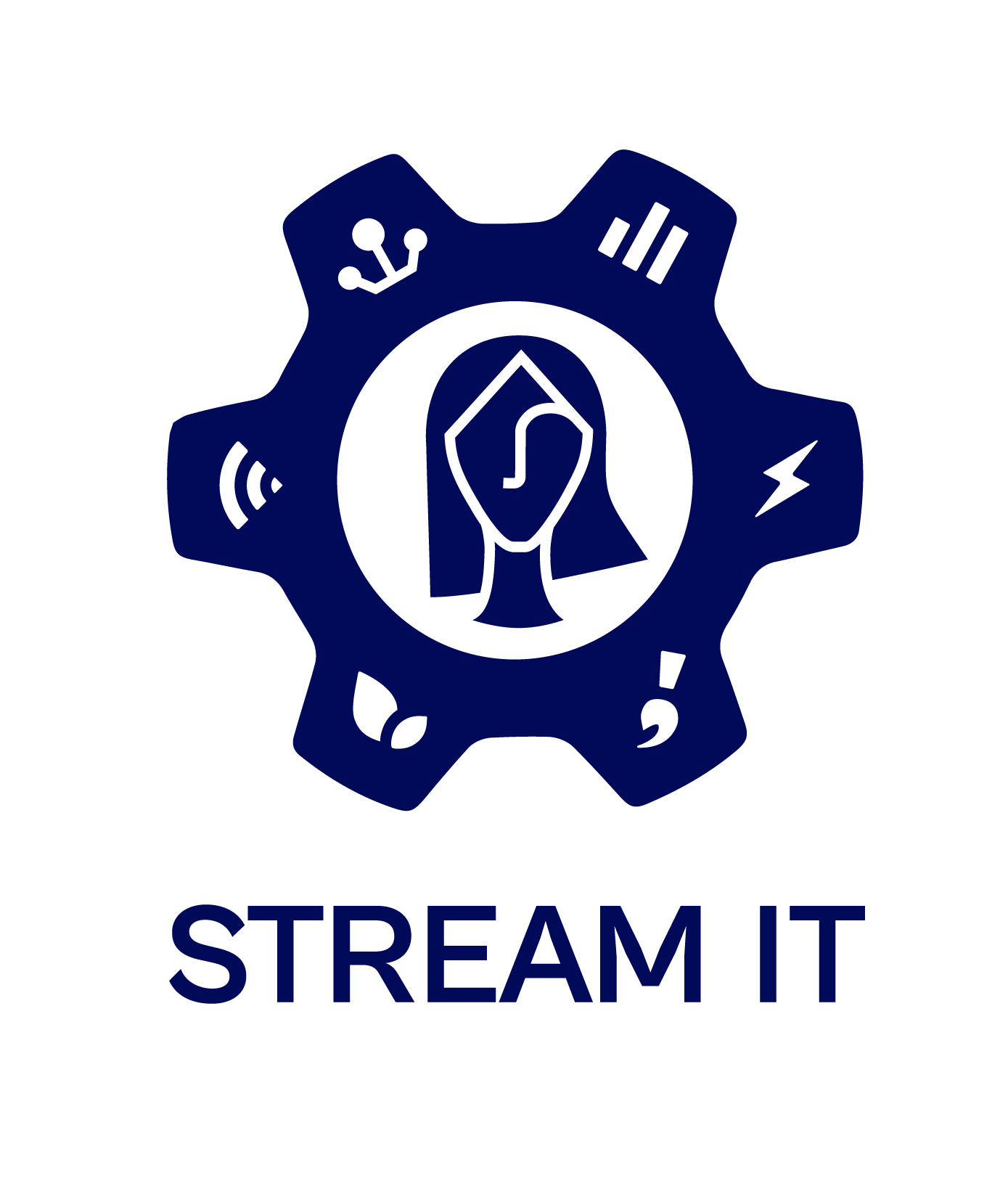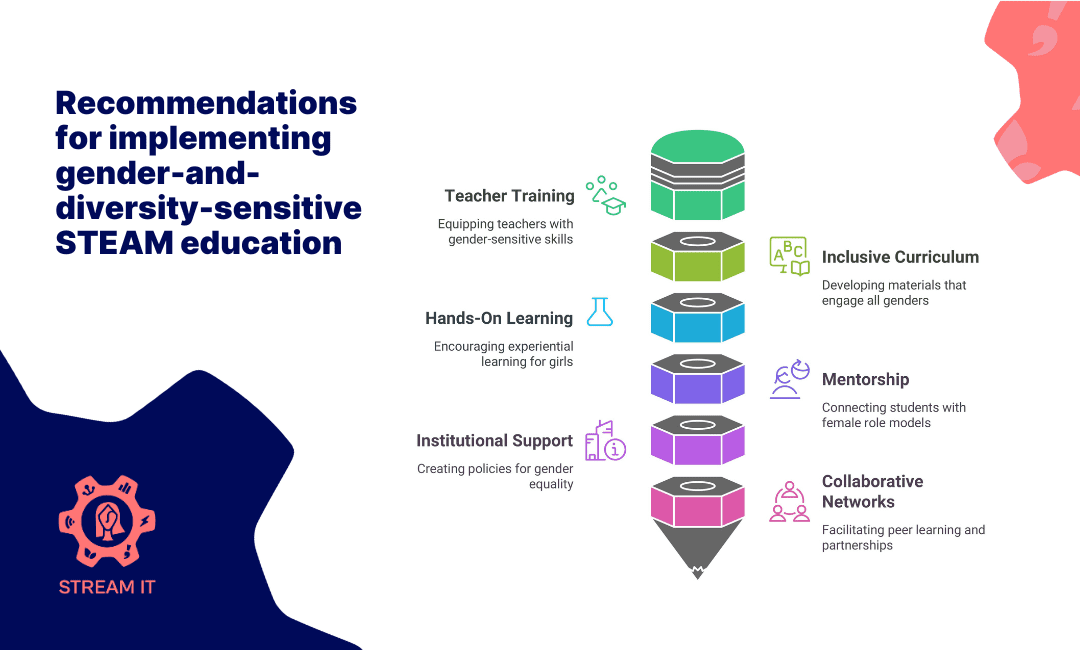The STREAM IT project is dedicated to breaking down barriers and creating inclusive opportunities and careers for girls and women in STEAM. As part of these intentions, the STREAM IT project is piloting 3 educational activities to see how the gender and diversity dimension can be incorporated into the teaching materials and the learning environment.
The three activities are:
- Nurturing Talent – Workshop series for supporting girls to orient towards STEM
- Hands-on activities at science centres and museums
- Mentoring Programme empowering young talents in STEM education
As a first step in developing educational activities, the consortium created a guide to help the partners develop gender-sensitive educational methodologies and foster sustainable networks to support young women in STEAM. The methodology is summarised in Deliverable D2.4: Needs-based Concept and Methodology for Gender- and Diversity-Inclusive Hands-on Activities and Sustainable Collaborative Networks.
How was the document developed?
D2.4 builds on the following resources and previous project findings:
- D2.1 Research Report on Previous and Ongoing Initiatives on STEAM Education and Gender Equality (to be published in September 2025): This report provided a thorough analysis of existing research and ongoing initiatives within the European Union related to gender equality in STE(A)M fields. This report synthesised findings from a comprehensive desk review, project mapping, and qualitative interviews with key stakeholders involved in gender equality initiatives across Europe. The research identified numerous barriers, including societal stereotypes, institutional biases, and funding gaps, which disproportionately affect girls and women in STE(A)M fields. The report highlighted the importance of creating inclusive educational environments, where both boys and girls are equally encouraged to explore and pursue STE(A)M careers. Key challenges such as the perpetuation of gender stereotypes in educational content and the lack of gender-sensitive teaching methodologies were identified. D2.1 emphasised the importance of providing teachers and educators with the tools and training necessary to adopt gender-inclusive practices in their classrooms.
- Insights gathered from a Co-Creation Working Lab: A key component of this deliverable is the integration of outcomes from the Co-Creation Working Lab session, which was held on October 11, 2024. The project partners collaboratively developed recommendations for the educational streams to be implemented in the project. Participants shared their insights on gender-sensitive and inclusive methodologies and best practices, which were then refined through joint ideation sessions.
- Concept notes on methodologies for implementing the various project activities developed by the work package leaders
Recommendations for implementing gender- and diversity-sensitive STEAM education
The recommendations presented in this deliverable are a synthesis of all the aforementioned inputs, combining the insights of previous deliverables, some preliminary research results and practical experiences that partners shared during a collaborative brainstorming session organised within the 2nd Co-creation working lab. These recommendations aim to provide support for the partners implementing the pilot educational activities or anyone interested in implementing gender-sensitive methods in teaching.
The recommendations presented in this deliverable are framed around the following key areas:
Teacher training and their professional development for applying gender-sensitive approaches
One of the most critical components of promoting gender inclusion in STEAM is equipping teachers with the necessary skills and knowledge. The recommendations call for comprehensive training programs that focus on gender-sensitive pedagogies, inclusive curriculum development, and gender bias-free classroom practices. Teachers should be trained to recognise and challenge gender stereotypes in both the content they deliver and the interactions they have with students. Teachers should be trained to know the signs of micro-aggressions, and to actively be trained how to handle them and thereby create safe spaces for girls. Additionally, continuous professional development should be offered to ensure that educators stay updated on best practices in gender-inclusive education.
Inclusive Curriculum and Learning Materials
The curriculum itself must be inclusive to encourage more girls to pursue STE(A)M careers. This means ensuring that female role models are represented in educational content and that teaching materials are designed to engage all students, regardless of gender. The recommendations suggest developing a curriculum that highlights the contributions of women in STE(A)M and offers hands-on activities that appeal to a broad range of learning styles.
The Confidence Gap: When Doubt Overshadows Talent
Even when girls perform just as well, or even better, than boys in STEAM subjects, they are far more likely to doubt themselves. Studies show that while boys often overestimate their abilities, girls tend to underestimate theirs. This lack of confidence leads them to hesitate in taking advanced courses, applying for competitive programs, or speaking up in class. Over time, these small moments of self-doubt accumulate, making it easier for them to walk away from STEAM altogether.
Hands-On Learning and Real-world Applications
Recommendations in connection to the educational activities to be implemented in Work Package 3 reveal that hands-on learning is a powerful tool for engaging girls in STE(A)M subjects. The recommendations encourage educators to incorporate more experiential learning opportunities, such as science experiments, engineering challenges, and field trips to companies. These activities should be designed to show the real-world applications of STEAM fields and how they can be used to solve pressing societal challenges, which often resonate with girls’ interests.
Mentorship and Role Models
Mentorship will be a key project activity in supporting young women in STE(A)M fields. The recommendations emphasise the importance of creating mentoring programs that connect young women university students/PhD students with women who are currently working in STEAM careers. These mentors can provide guidance, support, and inspiration, helping to break down the barriers that young women often face when considering a career in male-dominated fields.
Institutional Support and Policy Development
At the institutional level, there must be a commitment to fostering an inclusive environment that supports gender and diversity inclusion in STEAM education. The recommendations and concept note of Work Package 5 call for the development of policies that promote gender equality, such as equal access to resources and opportunities for leadership roles.
Sustainable Collaborative Networks
Building on the work of the Concept note for Work Package 4, it is highly recommended to create sustainable networks that support peer-to-peer learning among educators and the sharing of best practices across borders. National Inspirational Hubs and Virtual Makerspaces should be expanded beyond the partnership to facilitate ongoing collaboration among STE(A)M educators, researchers, and institutions. These networks should also include private sector partners who can provide real-world insights and opportunities for young women in STE(A)M fields.
Challenges Ahead
Despite the promising strategies we already learned through previously implemented projects and best practices, challenges remain:
The research conducted within the STREAM IT project revealed persistent gender disparities in STEAM, influenced by societal stereotypes, lack of female role models, and institutional biases. Based on our findings and the recommendations collaboratively developed with the partners our key suggestions for improving gender- and diversity STEAM education are:
- Overcoming deep-rooted gender stereotypes in STEAM fields.
- Ensuring sustained institutional commitment to gender equality initiatives.
- Addressing financial barriers that limit access to STEAM education for underprivileged students from an early age.
- Providing comprehensive training programs for teachers.
- Implementing whole-school programmes for sustainable changes.
Authors

HÉTFA Research Institute
Katalin Oborni, Senior Project Manager at HÉTFA’s Division of International Cooperation, coordinating the STREAM IT and RE-FEM projects, holds a PhD in Sociology and master’s degrees in History, Pedagogy, and Gender Studies. Her research covers work dynamics, gender equality, women’s entrepreneurship, and leadership. With extensive experience coordinating Erasmus+ projects and managing Horizon and CER EQUAL initiatives, Katalin’s research and coordination expertise ensure effective project management and delivery. She is also the Gender officer for a COST Action project (PROFEEDBACK) coordinated by HETFA RI.

HÉTFA Research Institute
Csenge Polgár is a Junior International Project Manager at HÉTFA Research Institute – Division for International Cooperation in Budapest, Hungary. She holds a Master’s degree in Sociology. Her background in Sociology has equipped her with diverse research skills. In her role as a project manager, she manages tasks related to EU-funded projects (Erasmus+, HORIZON), and she is responsible for communication management.

